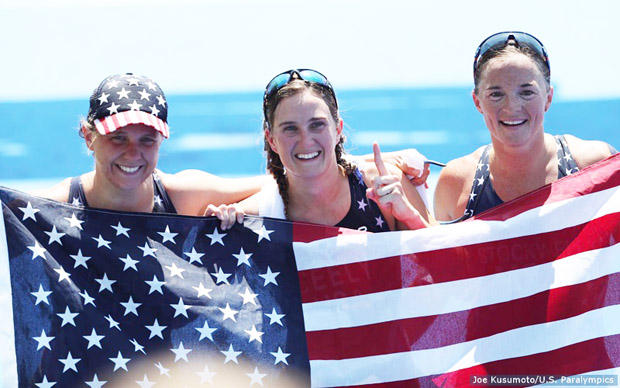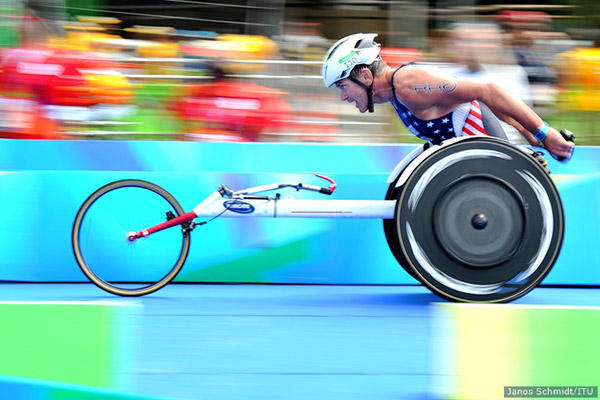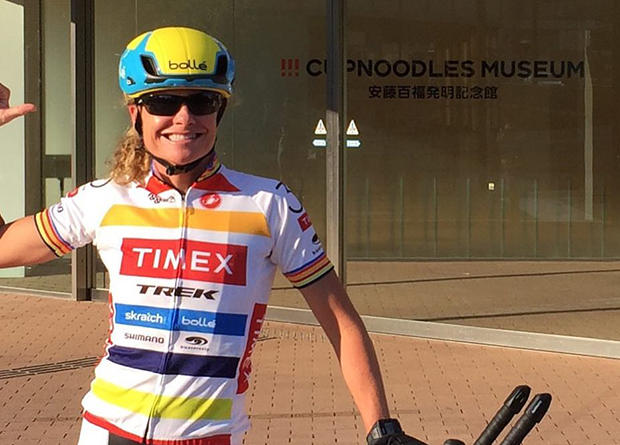When you stumble, you get up again
American Liz Baker was in a battle for the bronze medal spot at the Paralympics PT5 triathlon event in Rio when she stumbled and fell. But this Chattanooga, TN based athlete who is legally blind got back up and crossed the finish line with her guide Jillian Petersen. This however is not the first time where Baker had to overcome adversity.
Slowtwitch: Thank you so much for your time Liz.
Liz Baker: Your interest in my story means a lot to me. Thanks for thinking of me.
ST: You finished fourth today in a very dramatic fashion. Can you describe what went through your head as you stumbled?
Liz: I felt dizzy within the first 100 meters of the run. The dizziness had increased throughout the run, but my legs and body felt pretty strong. And my legs still felt good when I passed Melissa to take over 3rd place with half a mile left to go. It was not until that moment on the blue carpet, so near the finish, when I got really dizzy and all of a sudden lost all motor control of my legs and hit the ground. I was a bit delirious at that time, so it was not really until I mentally came back after minutes in the medic tent that the sting of the end result really hit. I have since replayed it in my head a lot to try and determine if I could have done anything differently. Although I am disappointed with the end result, I am certain I gave my max effort each moment of that race. My only regret is that I did not have the where with all to absorb and celebrate crossing the finish line in such an awesome event.
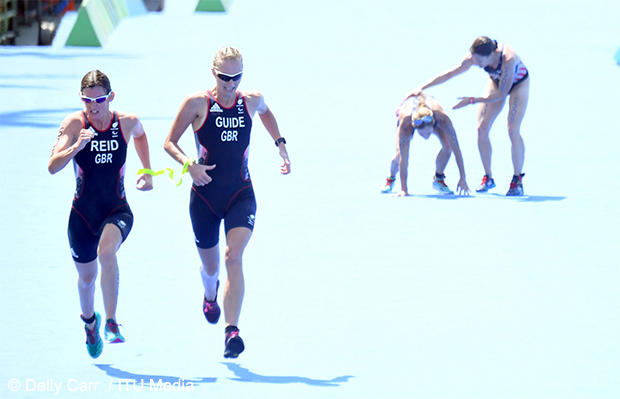
ST: Were you aware that the British team battling for that third place was right next to you?
Liz: When I hit the blue carpet, I knew they were about 7 seconds behind me. I didn’t know until I watched the video how quickly they closed the gap when my legs started to give out.
ST: What did Jillian say to you?
Liz: It was so sudden that I don’t think she said anything when I initially went down. When I managed to get up, I wanted to run to the finish, and she told me to just walk. I think she could tell I was still weaving and later told me she was nervous for my health because I had lost all color in my face.
ST: How did you actually get connected with Jillian Petersen as a guide?
Liz: The USAT staff and coaches knew of Jillian from her previous ITU racing background. She was in the Rio guide pool after being an alternate guide for an athlete who was hoping to qualify for Rio.
ST: Once you crossed the line who was the first person you talked to?
Liz: Unfortunately, I crossed the line and collapsed again. Race staff picked me up and took me by wheelchair to the medic tent. When I was able to stand and walk independently, I was able to leave. When I walked out of the tent, the US coaches were there and my family was cheering from across the street. I gave them a thumb up to let them know I was OK.
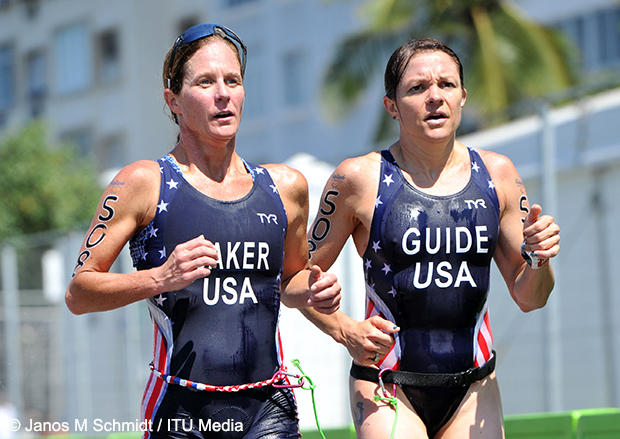
ST: Was your husband worried after that fall?
Liz: Yes, he was worried because he saw how quickly my run gate changed before I started veering right and then went down. He took a minute to console our kids, who were crying after watching me go down, before coming to find me in the medical area.
ST: Talk about that Rio Paralympics experience in general. To what degree was it what you had expected and what was different?
Liz: It surpassed my expectations. I feel like Rio had a lot of negative publicity prior to the race, which had me a little nervous since my two kids and my niece and nephew, all 10 years and under, were coming to watch multiple Paralympic events. I felt like everything from the Opening Ceremony to my race meetings and race were very well organized. I was overcome by how welcoming the Brazilians were to me and my family. The water was clear and fun to swim in and you could not ask for a more beautiful race setting.
ST: How big of a support crew did you bring?
Liz: In terms of loved ones, my husband, my two children, and my brother and sister–in-law and their two children. My parents really wanted to be there but they both have some health issues, so we decided it was better for them to support me from home. In fact, my mom ended up in the hospital for two days on the day she would have had to be on the plane for Rio, so I think we made the right decision.
We had a lot of team support with us. We had a great mechanic, three coaches, our team manager, the team doctor, a nutritionist, sports psych, and a PT.
ST: How are your parents and especially your mom now?
Liz: They are doing well. They were able to get twitter updates during the race. I know they were very worried when the update reported that “Baker is down,” especially after feeling the strong emotions upon learning how I had climbed from 6th to 3rd place. They are both so proud of me and continue to be overcome by emotions when they reminisce on how far I have come as a person and athlete since being with with me when I was diagnosed at age 15.
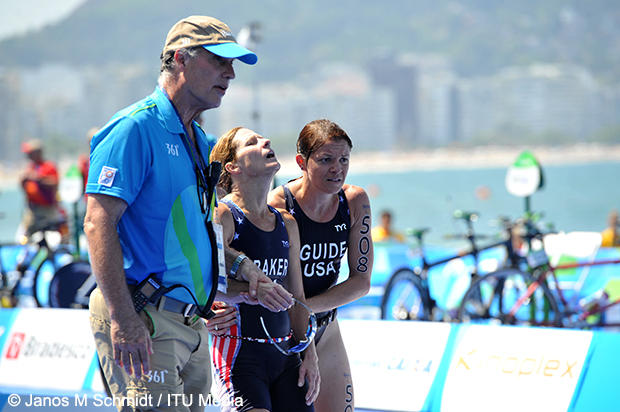
ST: For folks not familiar with the category PT5, can you explain what that means?
Liz: The PT5 classification includes athletes who have either partial or total visual impairment. The classification is then divided into B1 and B2/B3 athletes. B1 athletes range from people who are totally blind, to no light perception in either eye, to some light perception but unable to recognize the shape of a hand at any distance or in any direction. The B2/B3 athletes are partially sighted with a visual acuity of less than 6/60 vision or visual field less than 20 degrees with best corrective vision. B1 women have a 3 minute and 48 second factor, meaning they begin the race 3:48 ahead of the B2/B3.
All PT5 athletes must use a same sex guide and tether during the swim, ride a tandem bike, and tether during the run. A team can be disqualified if a guide leads the athlete at any point on the swim or the run that is not considered a “free leading zone” such as around a buoy on the swim or during turns on the run.
ST: So basically avoiding that a strong pro pulls an athlete during the swim and the run?
Liz: Yes, the guide cannot be a step ahead of the athlete during the run and cannot assist by giving a draft advantage during the swim.
ST: You were diagnosed at age 15 with "Stargardt's Disease" a disease where the eyesight steadily deteriorates. You are 42 now and can you talk about where your vision currently stands?
Liz: I had good vision until I was 19 and in my freshman year at UGA. At that time, I had a very rapid decline to about 20/120-160. I currently range from 20/200 to 20/400 depending on the day and the person giving the test. I feel I’ve lost more functional sight as compared to actual acuity. With Stargardt’s Disease the central/ detailed vision is most affected. I can see objects around me so that I can maneuver without a cane, and most people would not even be able to notice my visual impairment. I struggle with facial recognition and reading anything less than 24 font. What a fully sighted individual sees at 200-400 feet, I see at 20 feet.
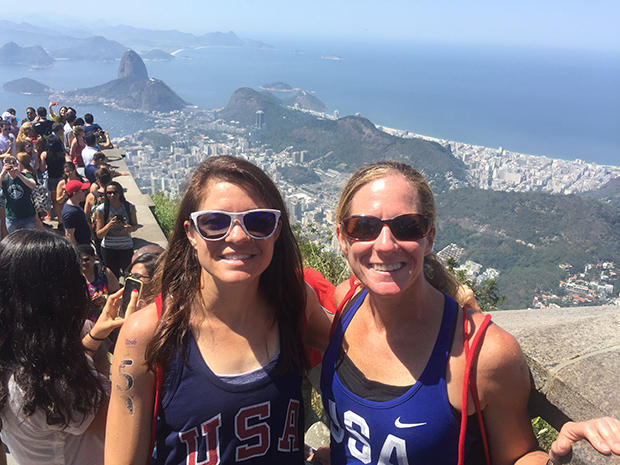
ST: When and how did you get started with triathlon?
Liz: I tried triathlon in 2002-2003, but I did not tell about my visual impairment because I was afraid they would not let me race. I tried racing on a QR PC Compact but spent more time on the ground than I did on the bike. After I had kids, I decided triathlon might not be the best sport for me. I returned to the sport to try and reach my personal goal of completing an IM in the same year I turned 40. Completing Ironman Chattanooga in Sept 2014 is what opened the door for me to paratriathlon.
ST: Has your husband also caught the triathlon bug?
Liz: He has! Unfortunately, his goals keep getting placed on hold because he has amazingly supported me by helping with everything that goes along with raising two children while I’ve focused on training and racing. He has squeezed in a couple 70.3 races with very little training.
ST: So what is next?
Liz: I can’t have my Rio race be my last ITU event, which I’d considered. I’m happy and proud of how I raced, but that’s not how I want to end my ITU career. I’ve only really been training for competitive racing about a year, so I’d like to see if I can continue to improve. If I find that improvements can still be made, and if financially I can find a way to continue, I’ll keep racing ITU.
ST: Are you done with IRONMAN?
Liz: I definitely hope to do some 70.3 races but cannot answer for certain on the full IM.
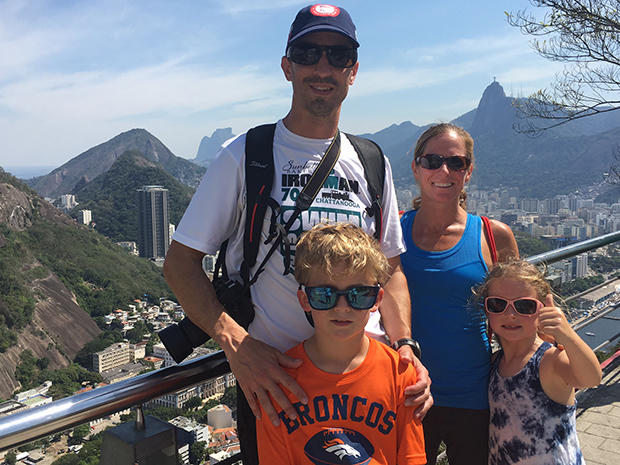
ST: Anything else we should know?
Liz: I’m just very grateful to have had such an amazing opportunity to represent my country. I’m thankful for Sara Gibson who agreed to begin this crazy journey guiding for me. Without Sara, I never could have started on this journey, and our win at CAMTRI earned us the Rio provisional spot on Team USA. Her husband, Kendrick Gibson, coached me and really changed who I am as an athlete!
Helen Phipps also played a big role in getting me ready for Rio. She travelled the world with me as my guide, and really helped me gain a lot more international experience.
And I cannot express enough the gratitude I feel for Jillian Petersen, who came in to my life only weeks before my Paralympic race. She prepared and raced this race as if it were her own. She quickly became a talented and excellent guide and I believe she is a stallion on the front of my tandem!


